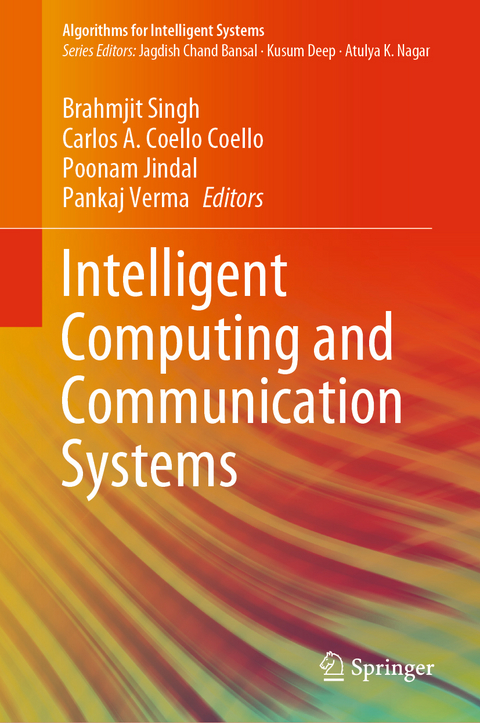
Intelligent Computing and Communication Systems
Springer Verlag, Singapore
978-981-16-1294-7 (ISBN)
Brahmjit Singh (Senior Member IEEE) is the Professor of Electronics and Communication Engineering, National Institute of Technology (NIT), Kurukshetra-136119 (India). He has published 171 research papers in international/national journals/conferences and co-authored four book chapters. He has been the Dean of Research and Consultancy and Chairman, Departments of Electronics and Communication Engineering and Computer Engineering NIT Kurukshetra. He is recipient of the Best Faculty Award (Administration)-2019 conferred by the Institute and the best research paper award from the Institution of Engineers (India). He obtained B.E. in Electronics Engineering from MNIT Jaipur, M.E. in Electronics and Communication Engineering with specialization in Microwave and Radar from Indian Institute of Technology Roorkee and Ph.D. from GGS IP University, Delhi. His current research interest includes machine learning in wireless communication, security in wireless networks, multimedia sensor networks and vehicular communication. He is the reviewer for several IEEE journals and conferences and presently serving as Vice Chair of IEEE ComSoc Delhi Chapter. Dr. Carlos A. Coello Coello received a Ph.D. in Computer Science from Tulane University (USA) in 1996. He is currently Full Professor with distinction (Investigador Cinvestav 3F) at CINVESTAV-IPN, Mexico City, Mexico. He has done pioneering research work on evolutionary multi-objective optimization and developed the first micro-genetic algorithm for multi-objective optimization and the first Pareto-based multi-objective artificial immune system. He has published over 480 papers in international peer-reviewed journals, book chapters and conferences and co-authored the book "Evolutionary Algorithms for Solving Multi-Objective Problems". With 46,000 citations, his h-index rises to 83. He received 2007 National Research Award, Mexican Academy of Science. He is IEEE Fellow for "contributions to multi-objective optimization and constraint-handling techniques" and the recipient of the prestigious 2013 IEEE Kiyo Tomiyasu Award (2012), National Medal of Science and Arts in the area of Physical, Mathematical and Natural Sciences and TWAS Award in Engineering Sciences. He serves as Associate Editor of several journals including IEEE Transactions on Evolutionary Computation, Computational Optimization and Applications, Pattern Analysis and Applications, Journal of Heuristics, Evolutionary Computation and Applied Soft Computing. Dr. Poonam Jindal is working with ECE Department National Institute of Technology Kurukshetra. She received her Ph.D. in Electronics and Communication Engineering from NIT Kurukshetra in 2016. She obtained degrees of M.Tech. and B.Tech. in 2005 and 2003, respectively. She has published 60 papers in various international journals and conferences and book chapters. Her research interests include wireless network security, wireless communication, physical layer security, Internet of things, and security optimization in wireless networks. She is IEEE Member and Regular Reviewer for various reputed international journals and conferences. Pankaj Verma received AMIETE (Associate Member of Institute of Electronics and Telecommunication Engineering) degree from Institute of Electronics and Telecommunication Engineers, New Delhi in 2009, M Tech in Microwave and Optical Communication from Delhi Technological University (formerly Delhi College of Engineering) in 2011 and Ph.D. from National Institute of Technology, Kurukshetra in 2017. He has been awarded Gold Medal in AMIETE (2009). Currently, he is working as an Assistant Professor in Electronics and Communication Engineering Department, National Institute of Technology, Kurukshetra, India. He has published several research papers in International/National journals and conferences. He is also having one-year industrial experience in Intellectual Property (IP) domain and earlier served Indian AirForce for three years. His research interests are in Wireless Communications, Cognitive Radio Systems, Optical Communication, Signal Processing, Visible Light Communication, Security, Machine Learning, Artificial Intelligence and Photonics Crystal Fibre Sensors.
Spectral Efficiency Analysis of Massive MIMO Systems.- Traffic Violations Prediction System on the basis of Human Behavior.- A Modified YOLO Model for On-road Vehicle Detection in Varying Weather Conditions.- Different Techniques used in Smart Traffic Light Management System using CCTV.- A Novel Rule-based Expert System For Penalty Prediction For Two Wheeler's Traffic Rules Violation in India.- Hybrid Material Based Dual-band Yagi-Uda Antenna with enhanced gain for the Ku-band applications.- Cheating Tolerant and Threshold based Secure Information Exchange among Propinquity of Adversaries.- A Review of Security Threats in Software Defined Networking.- Hardware based Analysis of PCG Signal for Heart Conditions.- Wireless Lighting System for Rural Households in India.- Sentiment analysis algorithms; Classifiers and their comparison.- Email sentiment classification using lexicon based opinion labelling.- Real Time Facial Emotion Recognition using Deep Learning.- Waste Segregation to ease Recyclability.- The Importance of Diversity in Multi-Objective Evolutionary Algorithms.- An Analysis and Comparison of Community Detection Algorithms in Online Social Networks.- Dynamic Reusability Measurement using Machine Learning Algorithms in Object Oriented Environment.- An Improvised Particle Swarm Optimization using Balanced Local Best.
| Erscheinungsdatum | 28.06.2021 |
|---|---|
| Reihe/Serie | Algorithms for Intelligent Systems |
| Zusatzinfo | 158 Illustrations, color; 40 Illustrations, black and white; XXIII, 417 p. 198 illus., 158 illus. in color. |
| Verlagsort | Singapore |
| Sprache | englisch |
| Maße | 155 x 235 mm |
| Themenwelt | Informatik ► Theorie / Studium ► Künstliche Intelligenz / Robotik |
| Technik ► Nachrichtentechnik | |
| Schlagworte | Green Computing • intelligent algorithms • intelligent communication systems • Intelligent Electronic Devices • IoT based Systems • Smart Systems |
| ISBN-10 | 981-16-1294-3 / 9811612943 |
| ISBN-13 | 978-981-16-1294-7 / 9789811612947 |
| Zustand | Neuware |
| Informationen gemäß Produktsicherheitsverordnung (GPSR) | |
| Haben Sie eine Frage zum Produkt? |
aus dem Bereich


